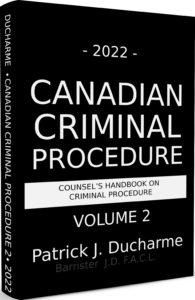 |
| Patrick Ducharme |
Here are some of the specific rules that defence lawyers working in criminal law and conducting criminal trials are obligated to know and follow. Each lawyer should be aware of these duties that he has to the client, and, to the court, and, to the legal system at large:
A duty to his client to be competent, and, to perform the legal services for which he/she was hired–conscientiously, diligently, and, in an efficient manner, so as to provide quality of service equal to that level that generally would be expected of a competent lawyer in a similar situation;
Included in this responsibility is the need to:
1 Keep the client reasonably informed.
2 Answer all reasonable requests from the client for information.
3 Respond in a timely fashion to the client’s inquiries.
4 Meet with the client as necessary in preparation of the client’s case in court.
5 Answer each reasonable inquiry by the client in a timely fashion.
6 Maintain office staff and facilities adequate to meet all clients’ needs.
7 Present and explain to the client all properly presented proposals of settlement or resolution by opposing counsel.
8 Provide all important information to the client being careful not to mislead the client as to the state of his case and ensuring that the client is aware of any aspect of the lawyer’s behaviour that amounts to neglect or mistake on the part of the lawyer.
9 Ensure that the lawyer is never guilty of self- induced disability, for example, from intoxicants or drugs which may interfere with or prejudice the lawyer’s service to the client.

The above is the an excerpt of Patrick J Ducharme's book, Canadian Criminal Procedure Volume 2, available at Amazon or in bulk through MedicaLegal Publishing along with Criminal Trial Strategies.
Subscribe to Patrick Ducharme's Youtube Channel
